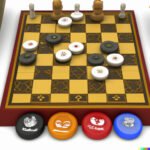Are you ready to dive into the world of Time of Crisis board games strategy? In these uncertain times, board games provide a welcome escape and a chance to exercise strategic thinking. Time of Crisis is an exciting board game that challenges players to navigate through tumultuous periods in history, making it a thrilling and thought-provoking experience for all.
Time of Crisis board games are not just about rolling dice and moving pieces on a board; they require deep understanding of game mechanics and strategic planning. To excel in this game, players must grasp the intricacies of its mechanics and develop effective strategies to outmaneuver their opponents.
Strategy is at the heart of Time of Crisis board games. The decisions players make throughout the game have long-lasting consequences, making it crucial to think several steps ahead. Whether you are a beginner looking for tips or an advanced player seeking new insights, honing your strategic mindset is key to achieving victory in this challenging yet rewarding game.
Understanding the Time of Crisis Board Game Mechanics
The Time of Crisis board game is an exciting strategy game that brings players back to the political turmoil of the Roman Empire. Understanding the mechanics of this game is crucial for success, as it involves a unique combination of deck-building, area control, and tactical maneuvering.
Players start with a basic deck of cards representing their influence and abilities within the empire. Throughout the game, they will acquire new cards to enhance their influence and strategically utilize them to gain control over different regions and factions. This intricate mix of card management and board control makes Time of Crisis a dynamic and engaging gameplay experience.
To succeed in Time of Crisis, players must grasp the intricacies of card actions, influence points, military strength, and senate support. Mastering these mechanics allows for a deep understanding of how to effectively navigate the ever-changing political landscape of the Roman Empire.
In Time of Crisis, every decision has consequences, and understanding the mechanics is essential for making informed choices that will impact both short-term gains and long-term success in conquering Rome. Players must continuously evaluate their position on the board, anticipate opponents’ moves, adapt to new challenges, and seize opportunities as they arise.
The strategic depth of Time of Crisis requires players to think critically and plan several steps ahead in order to emerge victorious in this time of crisis.
- Understanding card actions
- Maximizing influence points
- Navigating military strength and senate support
- Adapting to changing political landscapes
The Importance of Strategy in Time of Crisis Board Games
Time of Crisis board games are not just about luck or chance; they require strategic thinking and planning to outmaneuver opponents and emerge victorious. In a time of crisis, having a solid strategy can make all the difference in the outcome of the game. Whether you are a beginner or a seasoned player, understanding the importance of strategy is crucial to improving your gameplay and enjoying the experience.
Strategic Thinking and Decision Making
One of the key elements that sets Time of Crisis board games apart is the emphasis on strategic thinking and decision making. Players are required to analyze the current state of affairs, anticipate their opponents’ moves, and make calculated decisions to achieve their objectives. Developing a strong strategic mindset is essential for success in this game, as it allows players to adapt to changing circumstances and stay ahead of their competitors.
Adapting to Different Situations
In a time of crisis, unexpected events can arise that may require players to pivot their strategies accordingly. Being able to adapt to different situations is crucial in Time of Crisis board games, as it allows players to respond effectively to challenges and capitalize on opportunities. A flexible approach to strategy is beneficial, as it enables players to navigate through turbulent times with resilience and ingenuity.
Outthinking Your Opponents
Effective strategy in Time of Crisis board games involves outthinking your opponents and staying one step ahead. This requires careful planning, resource management, and tactical maneuvers to gain an advantage on the game board. By outmaneuvering your rivals through strategic gameplay, you can increase your chances of emerging victorious in this intense and competitive game setting.
Key Strategies for Effective Gameplay in Time of Crisis
Time of Crisis board games require players to employ strategic thinking and planning in order to achieve success. There are several key strategies that can be employed to ensure effective gameplay and increase the chances of victory in this time of crisis.
One important strategy is to focus on gaining control of regions with valuable resources, as this can provide significant advantages over opponents. By prioritizing resource-rich territories, players can build a strong foundation for their empire and strengthen their position in the game.
Another essential strategy is to carefully manage political influence and maintain a strong presence in the Senate. In Time of Crisis, political power plays a crucial role in shaping the course of events, and players must navigate the intricate web of political factions to secure their authority and influence. By strategically allocating political support and using it to advance their agenda, players can gain an edge over their rivals and exert control over key decisions within the game.
A third important strategy for effective gameplay in Time of Crisis board games is to adapt to the changing dynamics of the game and anticipate potential threats from opponents. Flexibility and foresight are vital components of successful gameplay, and players must be prepared to adjust their strategies based on evolving circumstances. By staying vigilant and assessing the actions of other players, individuals can position themselves strategically and mitigate any potential challenges that may arise during the course of the game.
| Strategy | Description |
|---|---|
| Resource Management | Prioritize gaining control of resource-rich territories. |
| Political Influence | Maintain a strong presence in the Senate and strategically allocate political support. |
| Adaptability | Be flexible and anticipate potential threats from opponents by adjusting strategies as needed. |
By incorporating these key strategies into their gameplay, individuals can enhance their overall performance in Time of Crisis board games and increase their likelihood of achieving victory during this critical time period.
Tips for Beginners and Advanced Players in Time of Crisis Board Games
When playing Time of Crisis board games, having a solid strategy is essential for success. Whether you are a beginner or an advanced player, understanding the key strategies can significantly impact your gameplay and increase your chances of winning. In this time of crisis board games strategy section, we will explore some tips to help both new and experienced players improve their skills and enhance their overall gaming experience.
For beginners, it’s important to familiarize yourself with the game mechanics and rules before diving into more advanced strategies. Take the time to understand how different elements of the game interact with each other, such as the influence of event cards, factions, and military units.
Learning the basics will provide a strong foundation for developing more complex tactics in future gameplay. Additionally, start by focusing on building a stable economy and strengthening your position on the map before engaging in direct conflict with opponents.
Advanced players should strive to fine-tune their strategic approach by analyzing their opponents’ moves and anticipating their next actions. Utilize your knowledge of historical context to make informed decisions that reflect real-world events from the time period. Pay attention to card management and carefully consider when to play certain event cards to gain maximum advantage over your rivals. Furthermore, adapting your strategy based on changing game dynamics is crucial for staying ahead in Time of Crisis board games.
| Beginner Tips | Advanced Tips |
|---|---|
| Familiarize yourself with game mechanics | Analyze opponents’ moves |
| Focus on building a stable economy | Utilize historical context for decision-making |
| Strengthen position on the map before conflict | Adapt strategy based on changing game dynamics |
Analyzing the Historical Context of Time of Crisis and How It Impacts Gameplay
Time of Crisis board games offer players an immersive experience by setting the game in a historically rich context. The game is set during the crisis of the Roman Empire, specifically during the third century AD. This historical backdrop serves as more than just a thematic element; it deeply impacts gameplay, strategy, and decision-making.
Understanding the historical context of Time of Crisis is crucial for players to develop effective strategies. The political, economic, and military challenges faced by the Roman Empire during this time period directly influence how players should approach the game. Taking into account historical events and their outcomes can provide valuable insight into making strategic decisions and adapting to changing circumstances.
To fully grasp the impact of historical context on gameplay, it is important to consider how different factions within the game are influenced by actual historical events. Whether playing as the Emperor, Senate, or one of the powerful generals striving for control, each faction’s unique strengths and weaknesses reflect their real-life counterparts during this turbulent period in history.
Players must also consider how their decisions and actions can shape history within the game. Understanding how certain choices may mirror or diverge from what actually happened during this time of crisis will greatly affect their overall gameplay experience.
Key points to consider include:
- How historical alliances and conflicts can influence player diplomacy
- The impact of economic stability or collapse in shaping strategic decisions
- Military tactics employed by real-life generals versus in-game tactical options
By closely analyzing the historical context of Time of Crisis, players can gain a deeper understanding of the game’s mechanics and develop more effective strategies for success.
Common Mistakes to Avoid in Time of Crisis Board Games
Playing Time of Crisis board games can be a thrilling experience, but it’s important to be aware of some common mistakes that can hinder your gameplay. By understanding and avoiding these mistakes, players can enhance their strategy and overall enjoyment of the game.
Underestimating the Importance of Securing Provinces
In Time of Crisis, controlling provinces is crucial for gaining resources and influencing the political landscape. One common mistake that players make is focusing too much on military conquest without prioritizing provincial control. As a result, they may find themselves lacking in resources and unable to exert influence where it matters most. To avoid this mistake, players should carefully balance their military campaigns with securing and maintaining control over key provinces.
Overlooking the Value of Political Influence
Another common mistake in Time of Crisis board games is underestimating the power of political influence. Players who focus solely on military might may neglect the importance of gaining political support and leveraging it to their advantage. By overlooking this aspect of gameplay, they may miss out on valuable opportunities to strengthen their position and sway the course of events in their favor.
Failing to Adapt to Changing Circumstances
Time of Crisis board games are dynamic, with shifting alliances, changing loyalties, and unpredictable events shaping the course of gameplay. One mistake that players often make is rigidly sticking to a preconceived strategy without adapting to evolving circumstances. It’s important for players to remain flexible and responsive to changes on the board, adjusting their plans as necessary to maximize their chances of success.
By recognizing and avoiding these common mistakes, players can sharpen their strategic skills and improve their performance in Time of Crisis board games. Whether you’re a beginner or an experienced player, being mindful of these pitfalls can lead to a more enjoyable and fulfilling gaming experience during this time of crisis.
The Evolution of Time of Crisis Board Games and Their Impact on the Gaming Community
In conclusion, Time of Crisis board games have become increasingly popular in the gaming community, offering players the opportunity to delve into historical contexts while also honing their strategic skills. Understanding the game mechanics is crucial for effective gameplay, as it allows players to make informed decisions and develop winning strategies. The importance of strategy cannot be overstated in Time of Crisis board games, as it can ultimately determine the outcome of the game.
For beginners, it’s essential to familiarize themselves with the key strategies for effective gameplay, such as focusing on building up influence and utilizing cards strategically. Advanced players, on the other hand, may find that analyzing the historical context of Time of Crisis adds an additional layer of depth to their gameplay. Exploring historical events and their impact on the game can provide valuable insights into crafting successful strategies.
As Time of Crisis board games continue to evolve, they are sure to leave a lasting impact on the gaming community. The appeal of combining historical context with strategic gameplay has attracted a wide range of players, from history enthusiasts to avid gamers. By avoiding common mistakes and continually refining their strategies, players can fully immerse themselves in this unique gaming experience and contribute to its ongoing success in the gaming world.
Frequently Asked Questions
What Is Considered the Most Complicated Board Game?
Considered the most complicated board game is “Go,” originating from China over 2,500 years ago. It involves strategic placement of black and white stones on a grid, aiming to capture territory.
What Board Game Takes the Longest to Complete?
The board game that takes the longest to complete is “Monopoly.” With endless opportunities for negotiation, trading, and property management, it can take several hours or even days to finish a game.
What Is the Old Board Game Called Strategy?
The old board game called strategy is “Chess.” Originating in India during the 6th century, Chess requires players to outmaneuver their opponent’s pieces with careful planning and foresight, making it a classic strategy game.

I love playing all kinds of games – from classics like Monopoly to modern favourites like Ticket to Ride.
I created this blog as a way to share my love of board games with others, and provide information on the latest releases and news in the industry.





